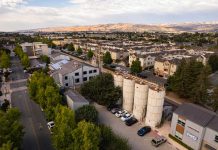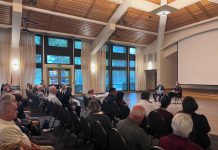We have much for which to be thankful. Indeed we do!
Three hundred and eighty-five years ago, a small group of immigrants celebrated the first Thanksgiving in America. The previous summer there had been a drought. They had set aside a day of prayer and fasting.
Their Indian neighbors watched with interest. God sent a gentle rain that nourished the soil and produced a bountiful crop. The Indians were impressed, when they held rain dances, the result was often hard rain that damaged and beat down the crop.
The account of the Pilgrim’s first Thanksgiving is recorded by William Bradford in his journal, “The Plymouth Plantation.” I wish every American student would read what Bradford had to say, as an on-site leader of this noble band. They would better understand the pride we have in our heritage.
My friend Larry Wagner, penned the following lyrics to a Pilgrim song.
“The second harvest gathered since they crossed Atlantic waters,
A feast of thankfulness was set by grateful Pilgrim Fathers:
So great the providence of God, so blest with fruit their labors,
So sweet the bond among their band, such peace with Indian neighbors.
“But most among the festive crowd could count harsh years of toil.
Of wand’ring for their faith in God, of want on alien soil.
Of flagging hopes and faith, bad health, of chills that hell could send,
Of half their number that had died before first winter’s end.
Of hunger pangs that second year in their New Plymouth home,
Of weeks when all they ate a day was five small grains of corn.
A few remembered treasure lost, of titles cast aside,
But all could measure conscience’ cost in tears and trampled pride.
Oh, at this feast could they forsee their blessed future years?
That nevermore would they know want, nor run from any fears!
Then after prayers of gratitude, before the feast was set,
Each plate was served five grains of corn, lest anyone forget!
A humble band in hardship born, rejected by their own,
A rock flung o’re the ocean, they were laid a cornerstone.
By them God stamped His pattern for a nation on the land,
And seeds of freedom under God were planted by their hand.
Oh, pray their heirs would ever know how dear was freedom’s cost,
And know to hold their faith and freedom dear, or see them lost,
And praise the Providence that brought those pilgrims to this shore,
And eat the grains of memory, or pay the price once more.”
The reference to “five grains of corn” is the daily food ration to which they were reduced in their hard second winter. Yet, in the spring, when they had the opportunity, not one of their group chose to return to England.
The quality of their character truly did set a foundation for our founding a century and a half after their arrival on these shores. In today’s politically correct, multi-cultural society, we are apt to overlook being thankful for the blessings our forefathers sacrificed so much to leave us.
Unlike the European top-down governmental model, we have just demonstrated the bottom-up model of self-government the Pilgrims helped establish. In America, we truly do have, “Government by the people.” Something for which we should be proud and grateful.
When it was established, they called it the “American experiment.” Many doubted that a society could remain self-governed, since, “all have sinned and come short…” We did survive and the result was the most successful, by any measure, of any nation in human history!
We have much for which to be thankful. Liberty is a precious thing. It is in short supply around the world. In our sheltered environment we tend to forget that. This Thanksgiving season, let us remember that liberty costs more than slavery because it is worth more than slavery.
We should be thankful that we have the resources to purchase and preserve liberty. Let us resolve to have the character and courage to do so.
Ben Gilmore is a Morgan Hill businessman. He’s a member of the Board of Contributors, which is comprised of local writers whose views appear in the newspaper on Tuesdays and Fridays.







